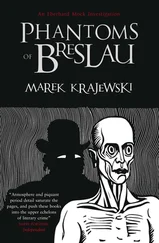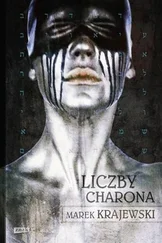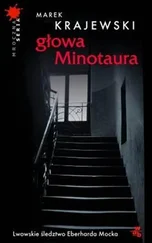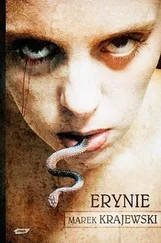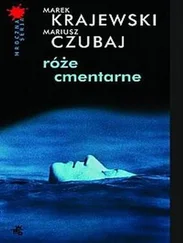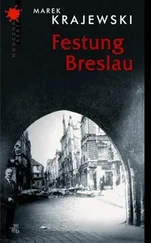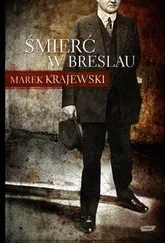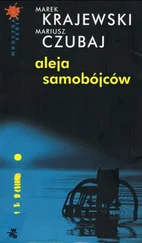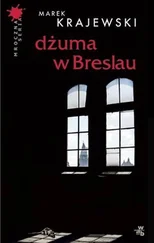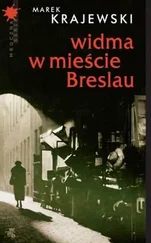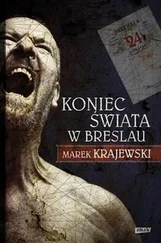Marek Krajewski - Death in Breslau
Здесь есть возможность читать онлайн «Marek Krajewski - Death in Breslau» весь текст электронной книги совершенно бесплатно (целиком полную версию без сокращений). В некоторых случаях можно слушать аудио, скачать через торрент в формате fb2 и присутствует краткое содержание. Жанр: Полицейский детектив, на английском языке. Описание произведения, (предисловие) а так же отзывы посетителей доступны на портале библиотеки ЛибКат.
- Название:Death in Breslau
- Автор:
- Жанр:
- Год:неизвестен
- ISBN:нет данных
- Рейтинг книги:3 / 5. Голосов: 1
-
Избранное:Добавить в избранное
- Отзывы:
-
Ваша оценка:
- 60
- 1
- 2
- 3
- 4
- 5
Death in Breslau: краткое содержание, описание и аннотация
Предлагаем к чтению аннотацию, описание, краткое содержание или предисловие (зависит от того, что написал сам автор книги «Death in Breslau»). Если вы не нашли необходимую информацию о книге — напишите в комментариях, мы постараемся отыскать её.
Death in Breslau — читать онлайн бесплатно полную книгу (весь текст) целиком
Ниже представлен текст книги, разбитый по страницам. Система сохранения места последней прочитанной страницы, позволяет с удобством читать онлайн бесплатно книгу «Death in Breslau», без необходимости каждый раз заново искать на чём Вы остановились. Поставьте закладку, и сможете в любой момент перейти на страницу, на которой закончили чтение.
Интервал:
Закладка:
“Where are you, Anwaldt?”
“At the station.”
“Wait for me on platform one. I’ll come and collect you right away. Repeat — which platform?”
“Plaaaatform … One.”
Mock did not find Anwaldt on platform one or on any other platform. Guided by his intuition, he went to Bahnschutz Police Station. Anwaldt was lying in a cell, asleep and snoring loudly. Mock showed the astounded duty constable his identification and politely asked for help. The constable eagerly barked some instructions to his men. They grasped the drunkard under the arms and carried him out to the Adler. Mock thanked the obliging constable and his colleagues, started the engine and a quarter of an hour later was back at Rehdigerplatz. All the benches on the square were occupied. People, resting after the day’s heat, watched with amazement as a stocky man with a sizeable belly, panting loudly, dragged an inert creature from the back seat of his car.
“He’s sozzled,” laughed a passing teenager.
Mock removed the drunken man’s jacket, soiled with vomit, rolled it up and threw it into the front of the car. Next, he threw the man’s left arm over his own sweaty neck, with his right he took him by the waist and, under the eyes of the mocking rabble, hauled him through the doorway. The caretaker, as if out of spite, was nowhere to be seen. “Anyone could walk through the door and that idiot’s probably drinking beer at Kohl’s,” he muttered furiously. He advanced step by step. His cheek rubbed against Anwaldt’s dirty, sweaty shirt. He shuddered every now and then as a sour cloud of breath swept over him, stopped on the half-landings and swore like a trooper, careless of the neighbours. One of them, the lawyer Doctor Fritz Patschkowsky, taking his dog for a walk, stood stock still, amazed, and the large Pomeranian practically tore itself from its leash. Mock glanced at the man with some hostility and did not respond to the haughty “good evening”. At last he reached his door and stood Anwaldt next to it. With one hand, he held him up; with the other, he struggled with the lock. A minute later, he was in the apartment. Anwaldt lay on the floor in the hall. Mock, sitting at the mahogany dressing-table, was breathing heavily. He closed the door and calmly smoked a cigarette. Next, he grasped Anwaldt by his shirt collar and tugged him to the games room. He took him under the arms, put him on to the gently sloping chaise longue, and searched his pockets. Nothing. (Some pick-pocket has already robbed him.) He loosened the tie, unbuttoned the shirt and removed the shoes. Anwaldt’s clothes were in a dismal condition, stained by grease and ash. On the thin cheeks, a two-day stubble fell like a shadow. Mock observed his subordinate for a while, then went out to the kitchen and ran his eyes thoughtfully over the green jars standing on the top shelf in the larder. Each of them had a parchment cap held in place by a pale rubber band. Finally, he found a jar containing dried mint. He poured two handfuls of the herb into a jug and then, with some difficulty, lit a fire under the stove. He fiddled with the stove lids for a long time until he found the right one and stood a shining, polished kettle on it. From the bathroom, he brought a tin basin and stood it next to Anwaldt’s bedding just in case, then returned to the kitchen. He lifted the steaming kettle and filled the jug containing the leaves with boiling water. Not knowing how to extinguish the fire, he drowned it with tap water. Then he took a cool bath and changed into a dressing gown. He sat at his desk, lit a fat Turkish cigar — one of the ones he kept for special occasions — and looked at the chessboard. Stalemate continued to paralyse the king-Eberhard Mock. He was still threatened by the knight-von der Malten and the queen-Kraus. But here, at the chessboard, appeared the white queen-Anwaldt — recovered from somewhere — and came to the king’s aid.
BRESLAU, WEDNESDAY, JULY 18TH, 1934
EIGHT O’CLOCK IN THE MORNING
Anwaldt opened his swollen eyes and immediately saw the jug and glass standing on the little table. With shaking hands, he filled it with strained mint tea and raised it to his lips.
“Shall I give you a knife to separate those lips?” Mock was tying his tie, spreading a spicy scent of quality eau de cologne and smiling kindheartedly. “Do you know, I’m not even furious with you. Because how can you be furious with someone who’s just miraculously been found? Click, Anwaldt was here and Anwaldt’s gone. Click, and Anwaldt’s here again.” Mock stopped smiling. “Nod if you had a good reason to disappear from my sight.”
Anwaldt nodded. Fireworks lit up inside his skull. He poured himself some more mint. Mock stood astride, observing his hung-over assistant. He clasped his hands and twiddled his thumbs.
“Good. I see you feel like drinking. That means you won’t be sick. I’ve run a bath for you. There’s one of my shirts in the bathroom and your cleaned and pressed suit. You certainly took care of it yesterday. I paid the caretaker’s wife an arm and a leg for her efforts. It took her half the night. She also cleaned your shoes. You’ll pay me back when you’ve got some money. Someone robbed you yesterday. Take a shave because you look like an alcoholic tramp. Use my razor,” Mock was harsh and decisive. “And now listen to me. In three-quarters of an hour you’re to sit here and tell me your adventures. Briefly and concretely. Then we’ll go to John the Baptist’s Cathedral. There, at nine-fifteen, Doctor Leo Hartner’s going to be waiting for us.”
They sat in the cool darkness. The violence of the sun stopped short of the coloured filter of stained-glass windows; walls of ashlar muffled the noise and bustle of the sweating city; Silesian princes slept in silent niches; and Latin signs on the walls invoked the contemplation of eternity. Mock’s watch showed nine-twenty. As agreed, they sat in the front row and watched out for Hartner. Instead of him, a short priest with a crew-cut and silver-framed spectacles walked up to them. Without a word, he handed Mock an envelope, turned and left. Anwaldt wanted to follow him, but Mock held him back. He took the typed letter from the envelope and passed it to his assistant.
“You read. I can’t see properly in this light and we’re not going out into that cursed heat.” On saying this, Mock realized that he was speaking in familiar terms to Baron von der Malten’s son. (If I was on familiar terms with Marietta, I can be the same with him.)
Anwaldt looked at the sheet of paper embossed with the University Library’s golden crest beneath which appeared the elegant letters of the Director’s typewriter.
Dear Excellency.
I apologize for not being able to attend our appointment personally, but family reasons prompted me to leave suddenly yesterday evening. I called Your Excellency several times, but you were not in. So let me speak through this letter for I have several important things to impart. All that I am now going to say is based on the admirable book Les Yesidis by Jean Boye, published ten years ago in Paris. The author, a well-known French ethnographer and traveller, stayed with the Yesidis for four years. They liked him and respected him to such a degree that he was admitted to some sacred rituals. Among the many interesting descriptions of the religious cult of this secret sect, one is particularly significant. And so, our author stayed somewhere in the desert (he doesn’t say exactly where) with several of the Yesidi elders. There, they visited an old hermit who lived in a grotto. This elderly eremite would frequently dance and fall into a trance like the Turkish dervishes. While he did so, he pronounced prophecies in an incomprehensible tongue. Boye had for a long time to implore the Yesidis to clarify these prophetic cries. They eventually agreed and explained them. The hermit proclaimed that the time of vengeance for the murdered children of Al-Shausi had come. Boye, knowing the history of the Yesidis very well, knew that these children had died at the turn of the twelfth and thirteenth centuries. He was surprised, therefore, that these born avengers had waited so long to fulfil their sacred duty. The Yesidis explained to him that, according to their law, vengeance is only valid if it corresponds exactly to the crime which it is to avenge. So that if someone’s eye had been gouged out with a stiletto, then his avenger had to visit the same barbarity on the criminal or his descendant, and not just with any ordinary knife but with a stiletto and — best of all — the very same one.
Читать дальшеИнтервал:
Закладка:
Похожие книги на «Death in Breslau»
Представляем Вашему вниманию похожие книги на «Death in Breslau» списком для выбора. Мы отобрали схожую по названию и смыслу литературу в надежде предоставить читателям больше вариантов отыскать новые, интересные, ещё непрочитанные произведения.
Обсуждение, отзывы о книге «Death in Breslau» и просто собственные мнения читателей. Оставьте ваши комментарии, напишите, что Вы думаете о произведении, его смысле или главных героях. Укажите что конкретно понравилось, а что нет, и почему Вы так считаете.

